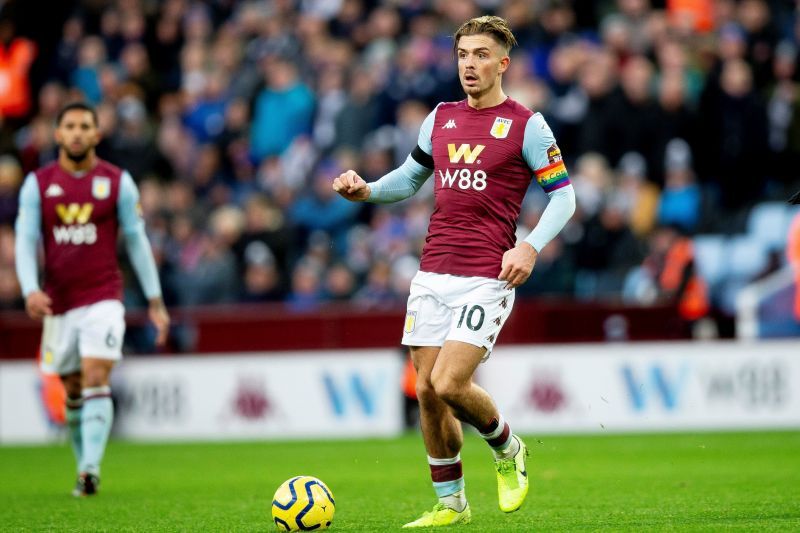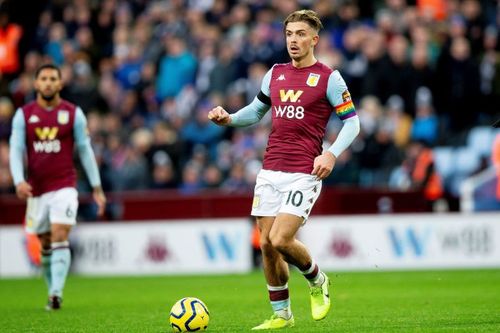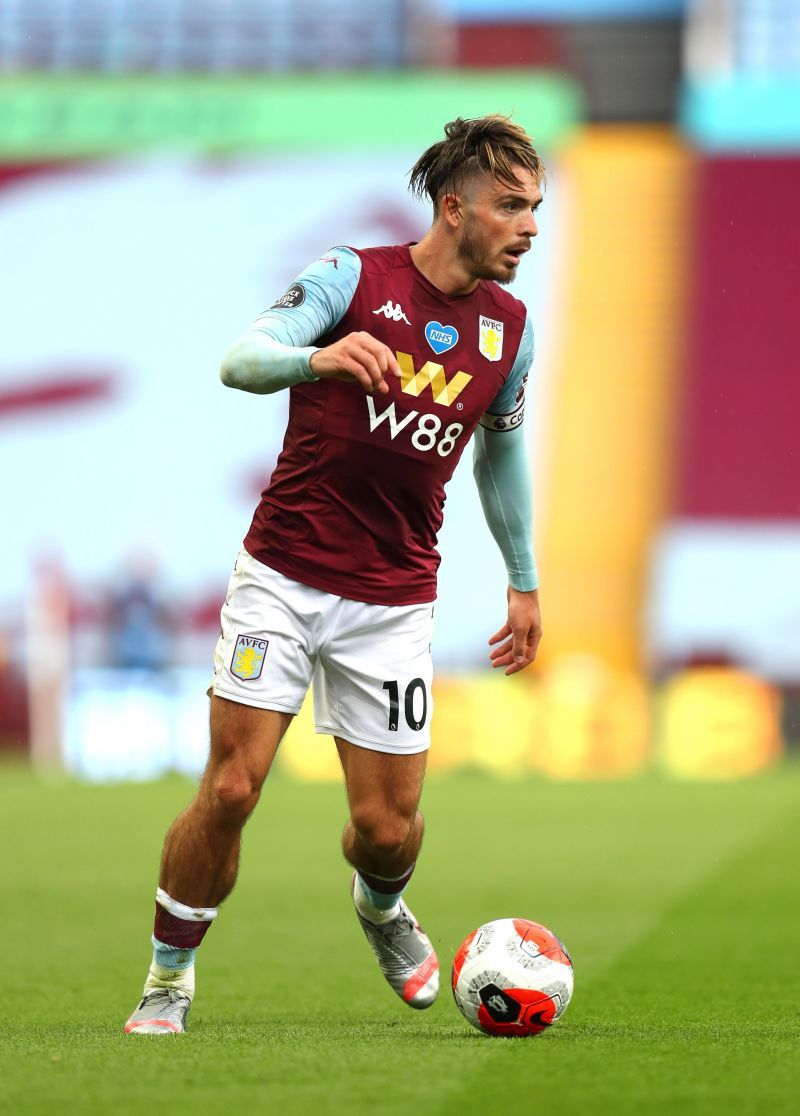
Is Jack Grealish the antidote to Manchester United's midfield woes?

For the first 60 minutes or so at the Tottenham Stadium, Manchester United were hapless. Granted, they were up against an organised team, crafted by, and emblematic of one of the most gifted and meticulous defensive tacticians in football's history. They were playing a professional football match after three months. It was the first time in the Premier League era that Premier League matches were being played out in the absence of a physical audience.
However, watching Fred and McTominay play ragged, predictable passes, often sideways, with their occasional forays into the opposition-third yielding no results, one couldn't help wonder what happened to the Manchester United midfield that, before the COVID-19 break, acted as a catalyst to the team's season-transforming form.
The answer is that nothing much has happened at all. Under Ole Gunnar Solksjaer, Manchester United have struggled to break teams down. Till the end of December, Manchester United had won five out of six games where they trailed in possession, while only winning one out 12 games where they led in terms of possession stats.
The numbers do, however, offer a slightly kinder reading after the arrival of Bruno Fernandes, but they don't detract from the fact that Manchester United is a team built to counter-attack. The art of finding gaps in opposition defences is largely irrelevant when the majority of the team's attacking tactics bank on getting the ball as quickly to the attacking triplet/quartet as possible, while the opposing team is committed in Manchester United's half.
It is this reliance on the counter-attack that renders Manchester United hapless when it comes up against teams that are happy to sit back and counter-attack themselves. It has been especially evident in Manchester United's struggles against Wolves this season, a team managed by another individual who has shown high prowess in organising his team defensively. It was evident again against Tottenham Hotspur.
A number of proponents of Manchester United, and Ole Gunnar Solksjaer in particular, have pointed to the lack of creative talent at the club. Admittedly, this view seemed to be vindicated when Paul Pogba came on at the hour mark against Spurs.
It was the first time Solksjaer got to field Bruno Fernandes alongside Paul Pogba, and it was also one of the handful occasions that Paul Pogba, whose season has been blighted by injuries, has put on a Manchester United shirt this season. For the first time, perhaps all season, Manchester United looked potent against an organised team that sat back and defended deep.
I do have to stress, however, that Bruno Fernandes and Pogba have only played half an hour of football together, and the partnership, while improving Manchester United's attack, could expose the team defensively.
However, even if one is to assume that Manchester United end up finding the right balance between attack and defence while fielding Bruno Fernandes and Paul Pogba together, the question of Pogba's future at the club still remains. It is here that Jack Grealish's name has been brought up, and as per reports, it comes with a high price tag: £ 70 million.
Is Jack Grealish the right man for Manchester United?

There are a number of questions that should be deemed fair to ask at this point. Is it justifiable to pay £ 70 Million for a player who will be 25 by the start of next season? Grealish has only one season as a first-team player in the top flight under his belt. Is his price tag an acceptable amount for a player who has no international caps?
Grealish's stats of seven goals and six assists in the Premier League this season can be considered impressive, especially considering the fact that he has played for a struggling team. But do these stats, considering all other factors, really translate into a transfer fee that eclipses the one Real Madrid paid for Kaka, a Ballon D'or winner, even after accounting for inflation?
Astronomical transfer fees for Premier League players, especially British players, have been attributed to a number of factors like excessive hype built around players by the league's global fanbase, the biggest for any football league in the world.
Premier League clubs have a high average income, that far eclipses that of most other top leagues in Europe. Any transfer between two clubs within the Premier League has a premium attached.
There are a number of examples for this premium. Andy Carroll, who in 2011, cost Liverpool a staggering £ 35 Million, an amount that may not raise many eyebrows in present times, was higher than both Manchester United's transfer record at the time and that of Liverpool's.
Ben Chilwell's present-day quoted valuation to Chelsea and Manchester City is £ 80 Million. Manchester United paid the same price to Leicester City for Harry Maguire. Sean Longstaff's quote of £ 50 Million and West Ham United's reported valuation of Declan Rice in the £80-100 Million range all point to the existence of such a premium.
Other examples include John Stones' record-breaking £ 50 Million transfer from Everton to Manchester City four years ago, which made him, at that moment, the second most expensive defender of all time.
Jack Grealish is certainly very talented. When he has the ball in his possession, he appears to glide with it. He's certainly capable of moments of magic, evident in his spectacular curling goal from the left flank against Manchester United. While he may have no international caps yet, given his current trajectory, an England call-up is unlikely to elude him for too long, despite the presence of James Maddison and Dele Alli in the England squad.
He's a very hard-working player, constantly trying to get possession of the ball, even deep in his own half and trying to create opportunities for Villa. While his defensive abilities are questionable, he doesn't seem to show any qualms in tracking back. In fact, if you take his transfer fee out of the equation, he would be a valuable addition to almost any team outside the Premier League's top two, and being a relatively young domestic talent, he seems to fit Manchester United's transfer profile under Solksjaer.
Further, one could argue, that, in a world where Harry Maguire, who himself had no experience at the top-most level, could cost £ 80 million, then Grealish certainly deserves a figure close to that amount.
While Harry Maguire hasn't justified his lofty price tag yet and has made mistakes, he does seem to have gradually grown into an irreplaceable player and an emerging leader for Manchester United.
None of Solksjaer's signings have failed, and Manchester United as a team has definitely progressed under him, especially in terms of style and in playing the 'United way'. If Solksjaer does firmly believe that Grealish is Pogba's only natural replacement, then the Manchester United board will probably sanction the transfer.
However, Manchester United should consider some alternatives in this regard. Since Mourinho's days, Manchester United have been after Sergej Milinkovic-Savic. While he is likely to command a similar price-tag, he has years of experience in the Italian top flight, has.played in the World Cup and is very talented.
While one could argue that he has fewer goals and assists than Grealish in a relatively less physical league, the numbers alone don't do justice to his prowess. Milinkovic-Savic contributes a lot more defensively to the team, is physically much stronger than Grealish and has the potential to be a towering presence and driving force in the box-to-box midfield role that Manchester United have lacked for a long time. The arrival of Milinkovic-Savic at Manchester United is likely to also allow Bruno Fernandes to flourish in a role that is freer and accomodating to his creative talents.
Saul Niguez is another alternative, and while he plays in a more holding role, having him sit back alongside the likes of McTominay, Fred, or Matic would allow Manchester United the freedom to commit more players in attack. Add to that Saul's creativity, a spectacular passing range and incisive passing ability.
Saul, while expected to be more expensive than Grealish and Milinkovic-Savic, would provide a proven world-class presence in the Manchester United midfield, and the United management may feel a lot safer in investing in such a proven alternative. There are a few other alternatives as well like James Maddison as well as Lille's Boubakary Soumare.
The decision to replace Paul Pogba, if he does leave in the summer, is likely to be based on a number of factors, including funds available. But Manchester United need to be extremely careful in sanctioning such a large amount for Jack Grealish, given that Ole Gunnar Solksjaer is finally seeming like he's getting a good team together at Manchester United. The price of a transfer failing may have major repercussions for the ongoing rebuild at Manchester United, that could perhaps exceed the exorbitant price tag of Grealish.